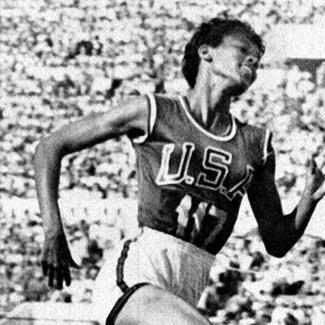Wilma Rudolph (Athlete/Triple Gold Medalist)
 Wilma Glodean Rudolph (June 23, 1940 – November 12, 1994) was an American athlete. Rudolph was considered the fastest woman in the world in the 1960s and competed in two Olympic Games, in 1956 and in 1960.
Wilma Glodean Rudolph (June 23, 1940 – November 12, 1994) was an American athlete. Rudolph was considered the fastest woman in the world in the 1960s and competed in two Olympic Games, in 1956 and in 1960.
In the 1960 Summer Olympics in Rome she became the first American woman to win three gold medals in track and field during a single Olympic Games.
A track and field champion, she elevated women's track to a major presence in the United States.
She is also regarded as a civil rights and women's rights pioneer. Along with other 1960 Olympic athletes such as Cassius Clay, who later became Muhammad Ali, Rudolph became an international star due to the first international television coverage of the Olympics that year.
The powerful sprinter emerged from the 1960 Rome Olympics as "The Tornado," the fastest woman on earth. The Italians nicknamed her "La Gazzella Negra" (the Black Gazelle); to the French she was "La Perle Noire" (The Black Pearl). She is one of the most famous Tennessee State University Tigerbelles, the name of the TSU women's track and field program.
Wilma Rudolph was born prematurely at 4.5 lbs., with 21 brothers and sisters, and caught infantile paralysis (caused by the polio virus) as a very young child. She recovered, but wore a brace on her left leg and foot which had become twisted as a result. By the time she was twelve years old, she had also survived scarlet fever, whooping cough, chickenpox and measles. Her family drove her regularly from Clarksville, Tennessee to Nashville, Tennessee for treatments to straighten her twisted leg.
In 1952, 12-year-old Wilma Rudolph finally achieved her dream of shedding her handicap and becoming like other children. Wilma's older sister was on a basketball team, and Wilma vowed to follow in her footsteps. While in high school, Wilma was on the basketball team when she was spotted by Tennessee State track and field coach Edward S. Temple. Being discovered by Temple was a major break for a young athlete. The day he saw the tenth grader for the first time, he knew he had found a natural athlete. Wilma had already gained some track experience on Burt High School's track team two years before, mostly as a way to keep busy between basketball seasons.
While she was attending Burt High School, Rudolph became a basketball star, setting state records for scoring and leading her team to the state championship. By the time she was 16, she earned a berth on the U.S. Olympic track and field team and came home from the 1956 Melbourne Games with an Olympic bronze medal in the 4 x 100 metres relay.
At the 1960 Summer Olympics in Rome she won three Olympic titles; the 100 m, 200 m and the 4 x 100 m relay. As the temperature climbed toward 110 degrees, 80,000 spectators jammed the Stadio Olimpico. Rudolph ran the 100-meter dash in an impressive 11 seconds flat. However the time was not credited as a world record, because it was wind-aided. She also won the 200-meter dash in 23.2 seconds, a new Olympic record. After these twin triumphs, she was being hailed throughout the world as "the fastest woman in history".
Finally, on September 11, 1960, she combined with Tennessee State teammates Martha Hudson, Lucinda Williams and Barbara Jones to win the 400-meter relay in 44.5 seconds, setting a world record. Rudolph had a special, personal reason to hope for victory—to pay tribute to Jesse Owens, the celebrated American athlete who had been her inspiration, also the star of the 1936 Summer Olympics, held in Berlin, Germany. Rudolph sprinted in the Drake Relays in Des Moines, IA and won first place.
Rudolph retired from track competition in 1962 at age 22 after winning two races at a U.S.–Soviet meet.
Rudolph was United Press Athlete of the Year 1960 and Associated Press Woman Athlete of the Year for 1960 and 1961. Also in 1961, the year of her father's death, Rudolph won the James E. Sullivan Award, an award for the top amateur athlete in the United States, and visited President John F. Kennedy.
She was voted into the National Black Sports and Entertainment Hall of Fame in 1973 and the National Track and Field Hall of Fame in 1974.
She was inducted into the U.S. Olympic Hall of Fame in 1983, honored with the National Sports Award in 1993, and inducted into the National Women's Hall of Fame in 1994.
In 1994, the portion of U. S. Route 79 in Clarksville, Tennessee between the Interstate 24 exit 4 in Clarksville to the Red River (Lynnwood-Tarpley) bridge near the Kraft Street intersection was renamed to honor Wilma Rudolph.
- Tags: inspiration Olympics sports success